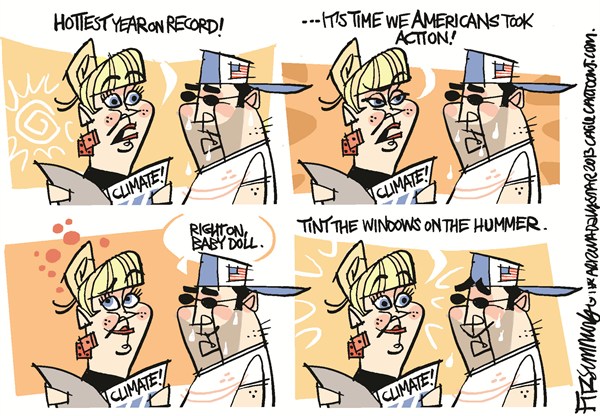Smart Energy
Another New Chapter in America's Leadership on Climate Change?

If you take into account the context of the hope and excitement that abounded among liberals in 2008 and contrast it with the tepid and sometimes downright silly policies put forward by the Obama administration thereafter, his most recent inaugural address should net little more than a raised eyebrow. However, I’m still getting pictures in my Facebook feed of a stunning and picturesque Obama coupled with strong words of climate change action. “My presidency will mark a new chapter in America’s leadership on climate change … ”
Oh, wait, I’m getting my dates and events mixed up. That’s what the then president-elect said in mid-November 2008 at Arnold Schwarzenegger’s Governors’ Global Climate Summit, when Obama took the initiative to send a special video message to all attendees, reassuring us that something would happen on this “urgent” issue. Back to the present.

Major energy and climate change issues are most likely headed down the wrong track. In 2012 the administration did put CO2 limits on new construction of power plants, effectively putting the kibosh on new coal plants, the dirtiest direct emitters in terms of greenhouse gases.
But that’s only half the story. Coal was already on the downhill due to market forces making natural gas cheaper, particularly because of the new natural gas “fracking” methods that have resulted in an oversupply and rock-bottom prices. Natural gas power plants emit less CO2 per unit of electricity generated, so are not covered by the recent regulation. Now there’s even talk of the United States exporting the “bounty” of natural gas, with energy companies grinning big at the prospect of selling to China and India.
There’s already a huge concern over these new fracking methods polluting groundwater, mentioned but sometimes glossed over by the Environmental Protection Agency. Perhaps more importantly, drilling a fracking well is not the easiest thing to do with a perfect seal, and most gas wells leak over time. Methane, the major component of natural gas, is an even stronger greenhouse gas than CO2, at least 23 times more powerful.
Some quick finger-tapping on your calculator can show you that all it takes is a tiny percentage leak in each natural gas well to make the greenhouse effect from natural gas worse than coal. Adding to that theoretical danger is actual recent data reported in the scientific journal Nature that points to leakage rates of up to 9% in some gas wells. But Obama’s recent regulation only restricts the burning that takes place at the power plant, not the leakage that goes into the air from the gas well.
So, while natural gas gets a VIP pass to make electricity and maybe even export to other countries, it’s perhaps the worst fuel to be using if you, like Obama just said a few days ago, are worried that failure on effective climate-change action would “betray our children and future generations.”
I don’t want to be a traitor to our future generations, so it’s important to know what we need and what we don’t. We need more wind, solar, and geothermal generation, which are getting cheaper by the year, but subject to topsy-turvy Washington politics and Solyndra scare stories. We need a tax on greenhouse gases at the source, including leakage potential.
Perhaps most importantly, we need to address our need to use less energy (which also means buying less stuff), including the problem of greater consumption cancelling out increased energy efficiency. Smart actions on these matters could result in economic growth – if we can keep Exxon, TransCanada, Koch Industries and others from dipping their fingers in the policy pie.
I couldn’t clearly parse that message out of Obama’s vague references to climate change and “technology,” which could include natural gas fracking and Canadian tar-sands oil just as easily as wind power and rooftop solar. I hope we get to see smarter and greener solutions in the next four years.



